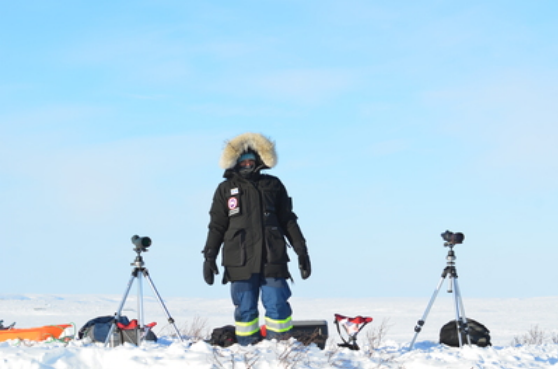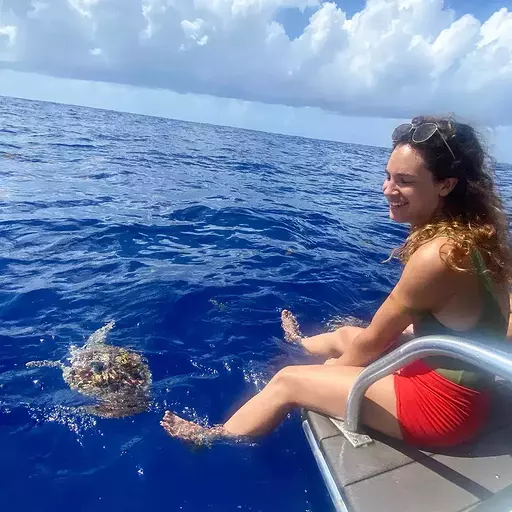Post-doctoral scholars

Dr. Ophélie Couriot
Ophélie is a wildlife ecologist focusing on the response of wildlife to global change. In particular, changes in movement behaviour of animals to human-induced changes to the climate and their environment. Ophélie investigates mechanisms across several scales: from the individual to the population, with a particular focus on barren-ground caribou in the North American Arctic.
She completed her PhD at the University of Toulouse (France) studying the impacts of spatiotemporal variation in resource and risk distribution on movement and activity patterns of two large lowland herbivore species in Europe: roe deer and red deer.

Dr. Nicole Barbour
Nicki is a movement ecologist with interests in applying quantitative methods to a variety of mobile taxa to better understand their ecology and inform novel conservation tools and methods.
Nicki’s dissertation work at the University of Maryland Center for Environmental Science and U. Maryland Dep’t of Biology focused on the movement ecology of sea turtles in different age classes. She recently also had projects on Sonoran pronghorn spatial ecology and resource use, finfish offshore aquaculture placement in the U.S., dynamic management tools for leatherback turtles, and shellfish aquaculture ecolabeling. Nicki is always eager for new and interesting collaborations. See more about her work and contact information at her website.
Ph.D. Students

Megan Perra
Megan is interested in how biological cues like soundscapes and interspecific vocalizations influence movement decision making in caribou. More simply: Do caribou eavesdrop on the soundscape to help them find good habitat patches? She completed her masters at the University of Alaska Fairbanks, where she studied caribou auditory physiology and the soundscapes of the Arctic Coastal Plain.
Check out her interview on Quirks & Quarks.
Chloe Beaupré

Chloe is fascinated by movement ecology. Her goal is to pursue research that fills information gaps and can be applied to important management actions. Chloe recently relocated to Syracuse from Colorado’s Western Slope after finishing a dual degree (Master in Environmental Management, Master of Science in Ecology), where she studied the influence of recreation on deer and elk and how many GPS collars to deploy to map migration and distribution at the population level for a slew of Colorado’s ungulate species.
Master’s Students

Ekaterina Khadonova
I am currently a Master’s student in Dr. Gurarie’s Wildlife Ecology lab exploring various aspects of environmental biology. Prior to commencing my SUNY ESF journey, I obtained my degree in Human Ecology from College of the Atlantic, where I got a chance to work across a variety of ecosystems, including Maine coast and islands, Costa Rica, and my home, Russia. My main goal is to work on protecting complex systems that sustain endangered and threatened species. I am passionate about bringing together the human and wildlife dimensions of conservation, which I attempt to accomplish through combining field research, modeling, policy, and public outreach for the projects I am involved with.
Graduate Research Topic Examining the impacts of selective predation by wolves on the spread of chronic wasting disease (CWD) in white-tailed deer in the western Great Lakes Region by developing and analyzing a spatially explicit, predator-prey-disease model informed by monitoring and behavioral data on deer and wolves, including human interventions (e.g., harvest).
Favorite Quote “Now I understand that one of the important reasons for going to college and getting an education is to learn that the things you’ve believed in all your life aren’t true, and that nothing is what it appears to be.” ― Daniel Keyes, Flowers for Algernon

Sydney Opel
Sydney is a Master’s student with an interest in carnivore conservation and ecology. Her goal is to seek a better understanding of movement, behavior and trophic interactions of carnivores to aid in the protection and conservation of carnivores in their native habitats.
Other … (and Invaluable)

Anna Brose
Anna is a communications and program manager for the Fate of the Caribou Project. Anna grew up alongside caribou in Alaska before receiving a bachelor’s in Wildlife Biology at Colorado State University. With extensive field experience across the United States, she has worked for several state and federal agencies in various wildlife research positions. She completed her Master’s in Wildlife Ecology at the University of Wisconsin - Madison in 2021, where she studied elk habitat use in northern Wisconsin. Anna is a self-taught science communicator and illustrator, and is a wildlife artist on the side.